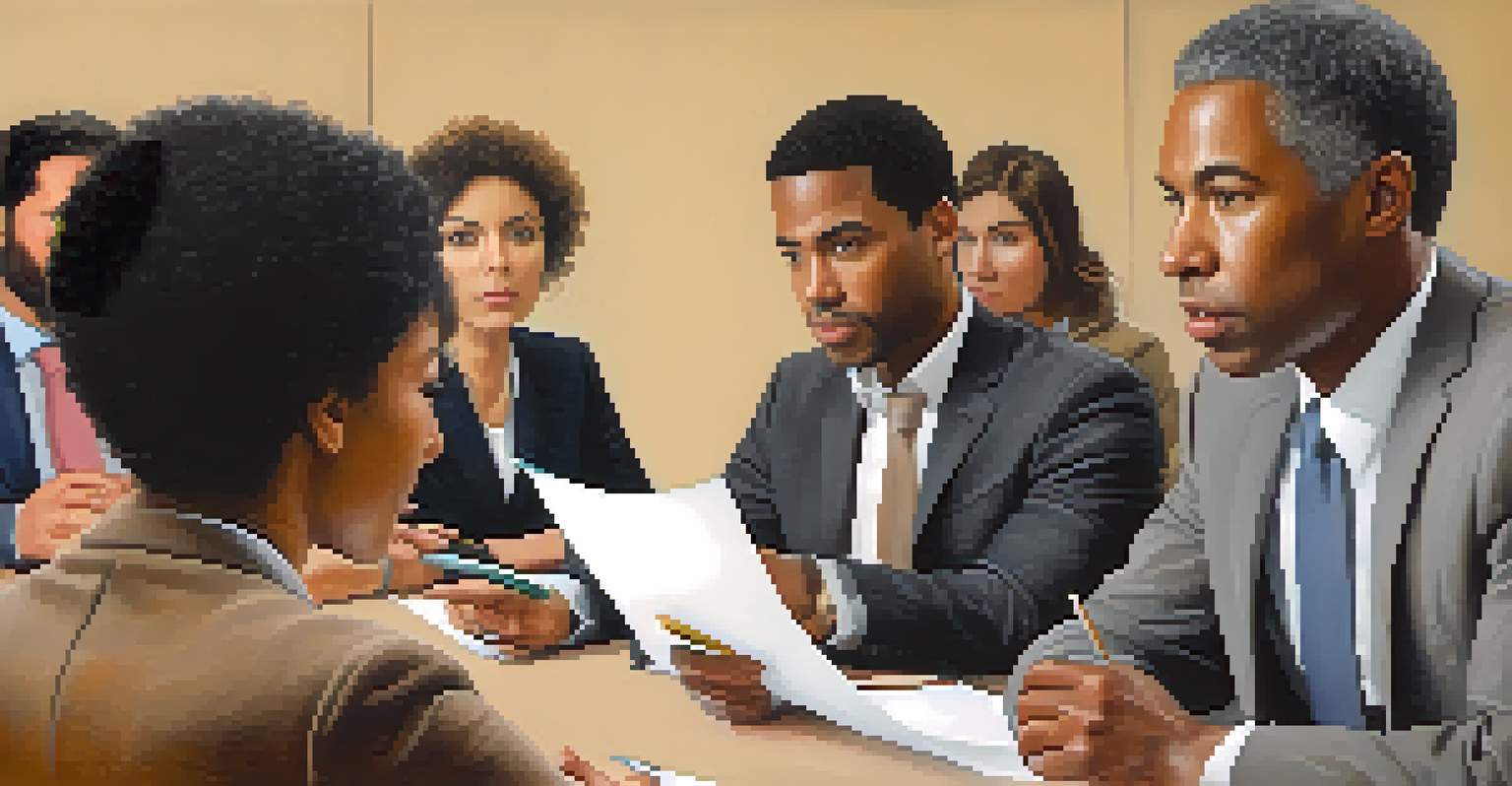Navigating Job Interviews: A Guide for Recent Graduates

Understanding the Job Interview Process
Job interviews can feel daunting, especially for recent graduates stepping into the professional world. It's important to understand that interviews are a two-way street; they help both you and the employer determine if it's a good fit. Familiarizing yourself with the typical stages, such as the initial screening, technical interviews, and final interviews, can help ease your nerves.
Success is where preparation and opportunity meet.
Most interviews begin with the employer asking about your background and qualifications. This is your chance to showcase your skills and experiences, so prepare to discuss your resume in detail. Also, don’t forget to research the company culture and values, as this will help you align your answers with what they’re looking for.
Finally, remember that interviews are not just about answering questions correctly; they’re also about building rapport. Engaging with your interviewer and showing genuine interest in the position can make a lasting impression, setting you apart from other candidates.
Researching the Company Ahead of Time
Before your interview, dedicate time to research the company thoroughly. Understand their mission statement, core values, and recent news or achievements. This knowledge will not only help you answer questions more effectively but will also demonstrate your enthusiasm for the role.

Consider visiting the company’s website, reading their blog posts, and browsing their social media channels. By gathering insights about their culture and projects, you can tailor your responses to show how you would be a great fit for their team. Plus, having specific questions about the company can showcase your interest during the interview.
Prepare for Interviews Thoroughly
Research the company and practice common interview questions to boost your confidence and show your enthusiasm.
Additionally, connecting with current or former employees on platforms like LinkedIn can provide insider perspectives. This can give you a better understanding of what it’s like to work there and could even lead to valuable tips for your interview.
Practicing Common Interview Questions
One of the best ways to prepare for an interview is to practice common interview questions. Questions like 'Tell me about yourself' or 'What are your strengths and weaknesses?' are frequently asked, and having polished answers ready can boost your confidence. Role-playing with a friend or using a mirror can help you refine your delivery.
The most important thing in communication is hearing what isn’t said.
While practicing, focus on structuring your responses using the STAR method—Situation, Task, Action, Result. This technique allows you to share clear and compelling stories that highlight your skills and experiences. For example, when discussing a group project, outline your role, the challenges you faced, the actions you took, and the positive outcome.
Remember, while practicing, it’s okay to be yourself. Authenticity resonates well with interviewers, and they appreciate candidates who are genuine in their responses. So, let your personality shine through as you rehearse.
Dressing for Success: First Impressions Matter
Your appearance can significantly influence the first impression you make in an interview. Dressing appropriately shows that you respect the opportunity and the company. Research the company’s dress code ahead of time; if it's unclear, it's better to err on the side of being slightly overdressed than underdressed.
For most professional environments, business casual is a safe bet. This could mean a tailored blazer, dress shirt, and slacks for men, while women might opt for a smart blouse with tailored pants or a conservative dress. Your goal is to look polished without being overly formal, allowing your personality to shine through.
Dress and Communicate Effectively
Dressing appropriately and mastering non-verbal communication can significantly enhance the impression you make during an interview.
Additionally, pay attention to grooming and hygiene. Clean, neat hair, minimal accessories, and appropriate footwear can enhance your overall appearance. Remember, feeling confident in how you present yourself can boost your confidence during the interview itself.
Mastering Non-Verbal Communication
Non-verbal communication plays a crucial role in how your message is received. Your body language, eye contact, and facial expressions can convey enthusiasm and confidence without saying a word. For instance, maintaining eye contact shows engagement, while an open posture can make you appear more approachable.
Be mindful of your gestures as well. Avoid crossing your arms, as it can signal defensiveness. Instead, use hand movements to emphasize your points naturally. Additionally, nodding occasionally during the conversation can indicate that you’re actively listening and interested.
Lastly, remember to smile! A warm smile can set a positive tone for the interview and make both you and your interviewer feel more at ease. Practicing these non-verbal cues can help reinforce your verbal answers and leave a lasting impression.
Asking Thoughtful Questions
At the end of most interviews, you’ll likely be asked if you have any questions. This is a golden opportunity to demonstrate your interest and engagement, so come prepared with thoughtful inquiries. Questions about the team dynamics, growth opportunities, or the company’s future can show that you’re invested in your potential role.
Avoid asking questions that can easily be found on the company’s website, as this may come off as unprepared. Instead, dig deeper; for example, inquire about the challenges the team is currently facing or how success is measured in the position you’re applying for. This not only reflects your interest but also provides valuable insights into the role.
Follow Up to Reinforce Interest
Sending a thoughtful thank-you note after the interview can help you stand out and demonstrate your professionalism.
Moreover, asking questions opens up a dialogue, making the interview feel more conversational. This can help to ease any tension and create a more relaxed atmosphere for both you and the interviewer.
Following Up After the Interview
Once the interview is over, it's essential to follow up with a thank-you note. This simple gesture can reinforce your interest in the position and keep you top-of-mind for the interviewer. Aim to send your thank-you email within 24 hours, mentioning specific points from the conversation to personalize it.
In your note, express gratitude for the opportunity and reiterate your enthusiasm for the role. If there were any questions you felt you could have answered better, this is a good time to address them briefly. However, keep it concise and focused on appreciation rather than making excuses.

Following up not only showcases your professionalism but also allows you to stand out in a competitive job market. It demonstrates that you value the interviewer's time and are genuinely interested in contributing to their team.